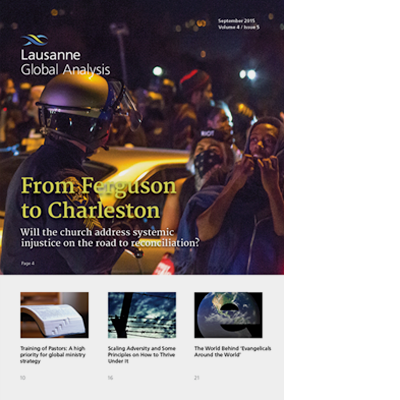Welcome to the September issue of Lausanne Global Analysis. We look forward to your feedback on it.
In this issue we challenge the church to address institutionalised racism and embrace reconciliation; we focus on the importance of pastoral training in undergirding other ministry initiatives globally; we suggest some principles on how to survive, and indeed thrive, under adversity; and we review some of the key findings in the newly released book Evangelicals Around the World: A Global Handbook for the 21st Century.
‘The shooting death [last year] of Michael Brown, a young, unarmed Black man, by a White police officer in Ferguson, Missouri, sparked a new level of national discourse in the United States on race, civil rights, and systemic injustice’, writes Paula Fuller (Vice President and Director of Multiethnic Ministries of InterVarsity Christian Fellowship). However, churches as a whole—especially majority-White churches—have been quiet regarding systemic injustice, while the Black church, as a whole, had remained silent too until the 17 June church killings in Charleston, South Carolina. As we engage the significance of ethnic conflict and systemic injustice for global mission, we need to remember that reconciliation is at the heart of God’s global mission. ‘For all of us—brothers and sisters empowered by the Spirit of God—it means investing our individual lives and corporate efforts in practical acts of restorative justice that change the world’, she concludes.
‘Pastoral health affects church health; church health affects societal health’, writes Ramesh Richard (Professor of Global Theological Engagement and Pastoral Ministries at Dallas Theological Seminary). The strengthening of pastors needs a higher priority and a higher proportion of ministry interest and attention among the many methodologies, strategies, and initiatives in missions today. Indeed, social ministries, evangelistic presence, and church planting need to be undergirded with pastoral training initiatives. Pastoral training justifies the cost and preserves the fruit of the other sacrificial and successful ministry efforts. Local pastors on the ground are the key people who need training. ‘Therefore, building a global pipeline to deliver such training as the focus and framework of all ministry efforts significantly accomplishes the final mandates of our Lord Jesus’, he concludes.
‘As a Jewish woman who has served as a missionary with Jews for Jesus for over 40 years . . . and as part of a people who have lived with persecution . . . , I have gleaned some principles on how not only to survive, but to thrive under adversity’, writes Susan Perlman (Associate Executive Director of Jews for Jesus). If we think in terms of an Adversity Scale that runs the full gamut of hardship Christians might endure, personal adversity is on the low end of the scale, political adversity is more complex and requires a more strategic response, and physical adversity—from moderate all the way to martyrdom—can be the most bewildering and challenging of all. The most recent Lausanne Consultation on Jewish Evangelism took place in August in Jerusalem. ‘Being in that place, we were deeply aware that Jesus had warned his followers to expect adversity as the norm. We anticipate that it will grow more intense. We can be assured that adversaries will arise with plans to annihilate Christians. However, they will not prevail’, she concludes.
The newly released book Evangelicals Around the World: A Global Handbook for the 21st Century is a collection of 51 chapters by 46 contributors. ‘It is the life of service of Evangelicals that I believe will capture the attention of readers of the book’, writes Karen Stiller (Senior Editor of Faith Today magazine). There are 23 stories of Evangelicals around the world engaged in ministry on the ground, showing the difference Evangelicals make in the communities they call home. Paul Joshua Bhakiaraj wrote the challenging chapter: ‘The Future of the Evangelical Movement’. He says: ‘The Evangelical Movement of the future will be a recognizably global movement, spread predominantly throughout the Southern and Eastern continents’, and defines the Evangelical Movement as ‘a gospel centered people in multiple and complex contexts’. ‘For those who call themselves Evangelical everywhere, the gospel is central and the contexts are complex indeed’, she concludes.
Whether you are planning to read the full articles or just the executive summaries, we hope that you find this issue stimulating and useful. Our aim is to deliver strategic and credible analysis, information, and insight so that as an influencer you will be better equipped for the task of global mission. It’s our desire that the analysis of current and future trends and developments will help you and your team make better decisions about the stewardship of all that God has entrusted to your care.
Please send any questions and comments about this issue to analysis@lausanne.org. The next issue of Lausanne Global Analysis will be released in November.

